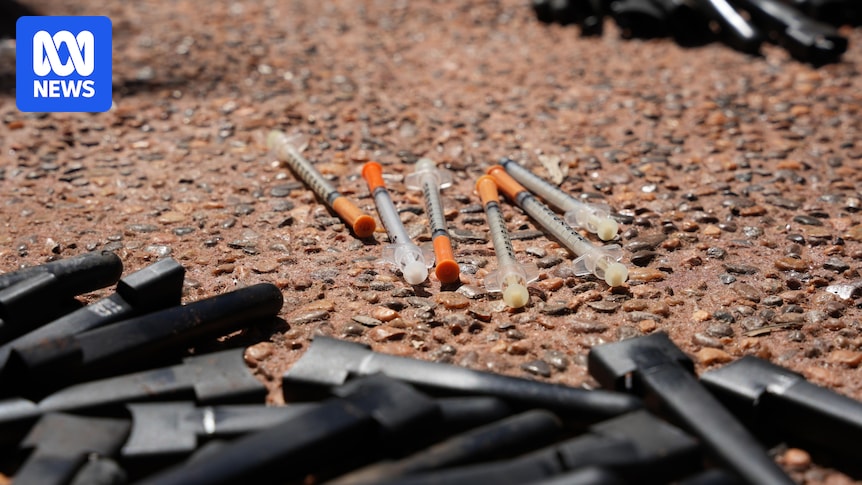A former hospital worker in Western Australia’s far north has raised the alarm after the number of needles handed out to patients almost doubled in 12 months.
The Needle and Syringe Program (NSP) is run by WA Health and aims to reduce the transmission of HIV, hepatitis B and hepatitis C by providing sterile needles to people who inject drugs.
Figures provided to the ABC show 144,000 needles and syringes were handed out in the Kimberley in 2023, almost double the previous year’s figure of 76,800.
This equates to an average of almost 400 handed out daily in a region of about 35,000 people.
Zoe, who the ABC has chosen not to name for privacy reasons, has worked at Broome Regional Hospital distributing needle and syringe packs, known as Fitpacks, as part of her job.
She said it left her feeling “uncomfortable”.
Residents say the number of needles discarded around Broome is increasing. (ABC Kimberley: Dunja Karagic)
Zoe said she was not allowed to ask patients for ID and she provided needles to people who appeared under 18.
The youngest person she gave a Fitpack kit to appeared “about 15 or 16 years old”, but she said she had seen colleagues distribute needles to children who looked “only 10 years old”.
“You can’t say no to these people, but at the same time you wonder, ‘Are they the ones using it? Have their parents told them to go and collect it?'” she said.
“Should we be offering these people intervention? … [They’re] definitely too young to be getting involved in narcotics.”
A 2023 study of 55 NSPs across Australia found methamphetamine was the most commonly reported drug injected nationally.
A Broome resident collected 60 needles and 290 needle covers across the town in 15 days. (ABC Kimberley: Dunja Karagic)
In WA parliament on Tuesday, Member for Mining and Pastoral Neil Thomson raised concerns by Kimberley health providers that children as young as eight were being provided Fitpacks.
He told the ABC a “mandatory requirement” to follow up with children accessing the NSP was needed.
“So we can just check these children are actually okay because the high probability is they’re not going to be okay,” Mr Thompson said.
“I think that’s just a terrible situation to put a child in.”
A surge in discarded needles
For the last couple of weeks, Natalie Kennedy has been walking the streets of Broome picking up discarded needles.
The Kimberley mother said she had noticed a “significant increase” in needles, something the ABC reported in May.
Natalie Kennedy has been picking up an increasing amount of needles discarded around Broome. (ABC Kimberley: Dunja Karagic)
“To the point we started carrying needle covers in our pram, so we could safely pick them up,” Ms Kennedy said.
“This is just going to get worse, the number we’re finding is just going to increase.”
In 15 days, Ms Kennedy said she had collected 60 needles and 290 needle covers scattered around public areas of the popular tourist town.
This week she found needles next to a Broome school, while a local primary school confirmed a girl was pricked by a needle on their grounds last week.
Health Service stands firm
Despite the issue being raised in parliament, a WA Country Health Service spokesperson denied children had access Fitpacks.
“Internal information was immediately reviewed and there was no evidence to suggest this is the case,” the spokesperson said.
A former Broome hospital worker has raised the alarm on children accessing needles. (ABC Kimberley: Mya Kordic)
“Frontline staff in Broome have also expressed concerns around the accuracy of the claim.”
The spokesperson declined requests for further clarification, including the ages of people handed needles, citing patient confidentiality.
The service defines “young children” as any child under the age of 16.
“WA Country Health Service agrees any instance of young children accessing Fitpacks is unacceptable and is taking immediate action to ensure it cannot happen.”
WA Country Health services did not respond to the ABC’s questions about whether staff were allowed to check patient IDs.
The WA Department of Health did not respond to questions by deadline.
